Serving looks for hours at a time can be taxing, but Regina King is focused, her gaze steady on the lens. On the third Friday of October, four days after the Hollywood premiere of HBO’s Watchmen and two days shy of the series’ launch, she’s posed-up inside L.A.’s Milk Studios on Cahuenga Boulevard as an R&B playlist flows from the speakers. Her call time was 8 a.m. Now, as five o’clock approaches and the shoot winds down, King gathers up her team to pop a few bottles. It’s been a good day.
Aside from a visit to Watchmen’s Atlanta set this past June and a 15-minute sit-down at the New York City–based press junket five months later, this one-on-one is the most time we’ve had to talk. Translation: Regina King stays working. And busy. Her journey exemplifies what is possible when you master your craft and stay the course. Stated simply, she is a legend.
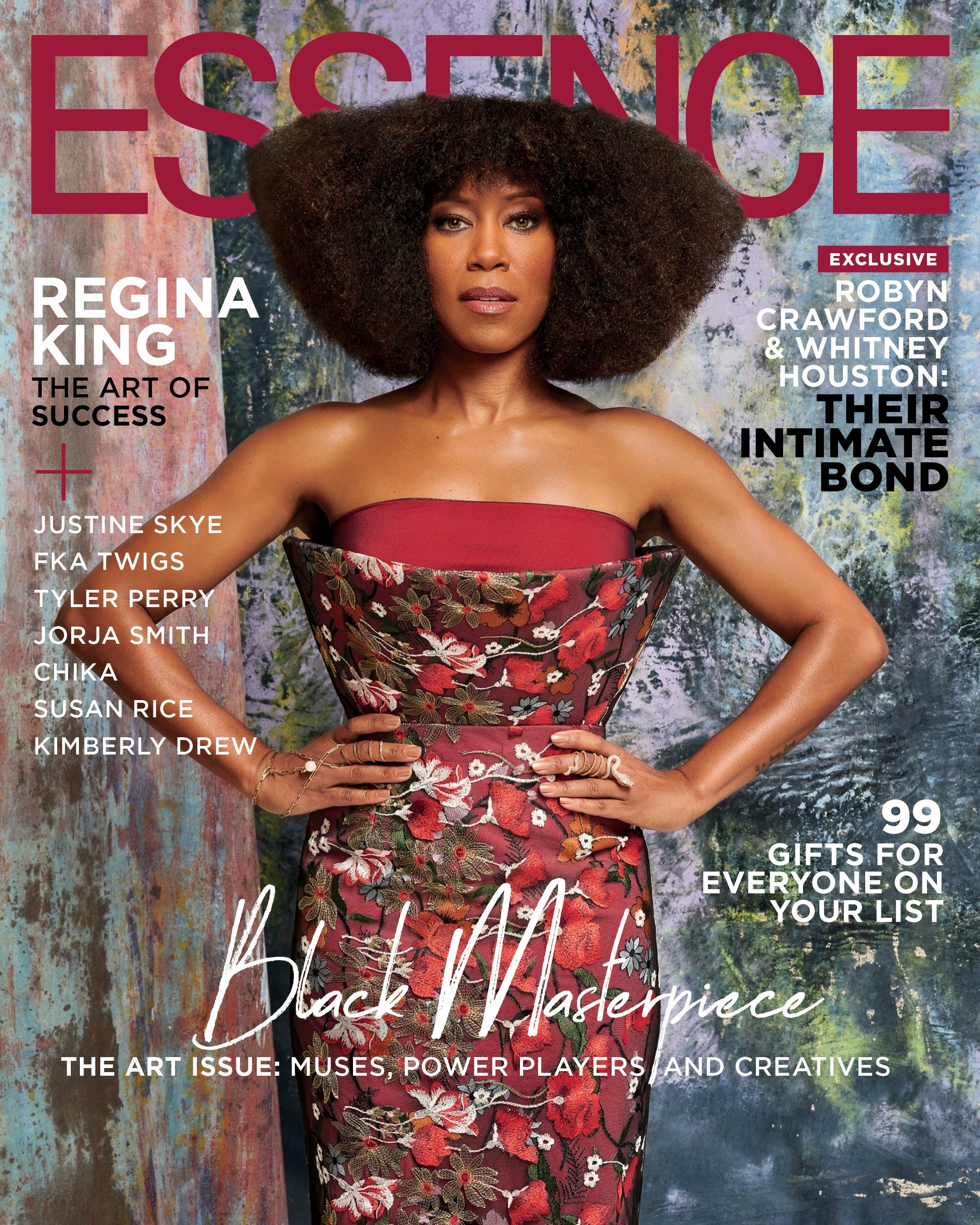
When it’s time for our interview, gone are the bold gold accessories, custom hairpieces, and shimmery gowns. She’s dressed down in a gray jumpsuit and wedge boots, bamboo hoops, and a patterned headwrap tied around her head. The only remains of the day are her lashes and manicure. As King settles in, she takes a deep breath and a sip from her glass of rosé. She’s relaxed and ready to roll.
King, 48, attended the 2019 ESSENCE Black Women in Hollywood Awards in February to present a statue to her If Beale Street Could Talk co-star KiKi Layne. Backstage was hectic, but the energy shifted upon her arrival. She was up for her first Academy Award for Best Supporting Actress, for Beale Street. A month before, she’d taken home the Golden Globe, and now the Oscar buzz was near deafening. But King is no diva. After saying her hellos and giving a few hugs, she turned her attention to her script and made a few last-minute edits. Then she waited in the wings for her introduction. “She’s an actress, producer, and director,” host Kelly Rowland began. “She’s also a 2015 ESSENCE Black Women in Hollywood honoree, a Golden Globe winner, three-time Emmy winner and newly minted Academy Award nominee.…”
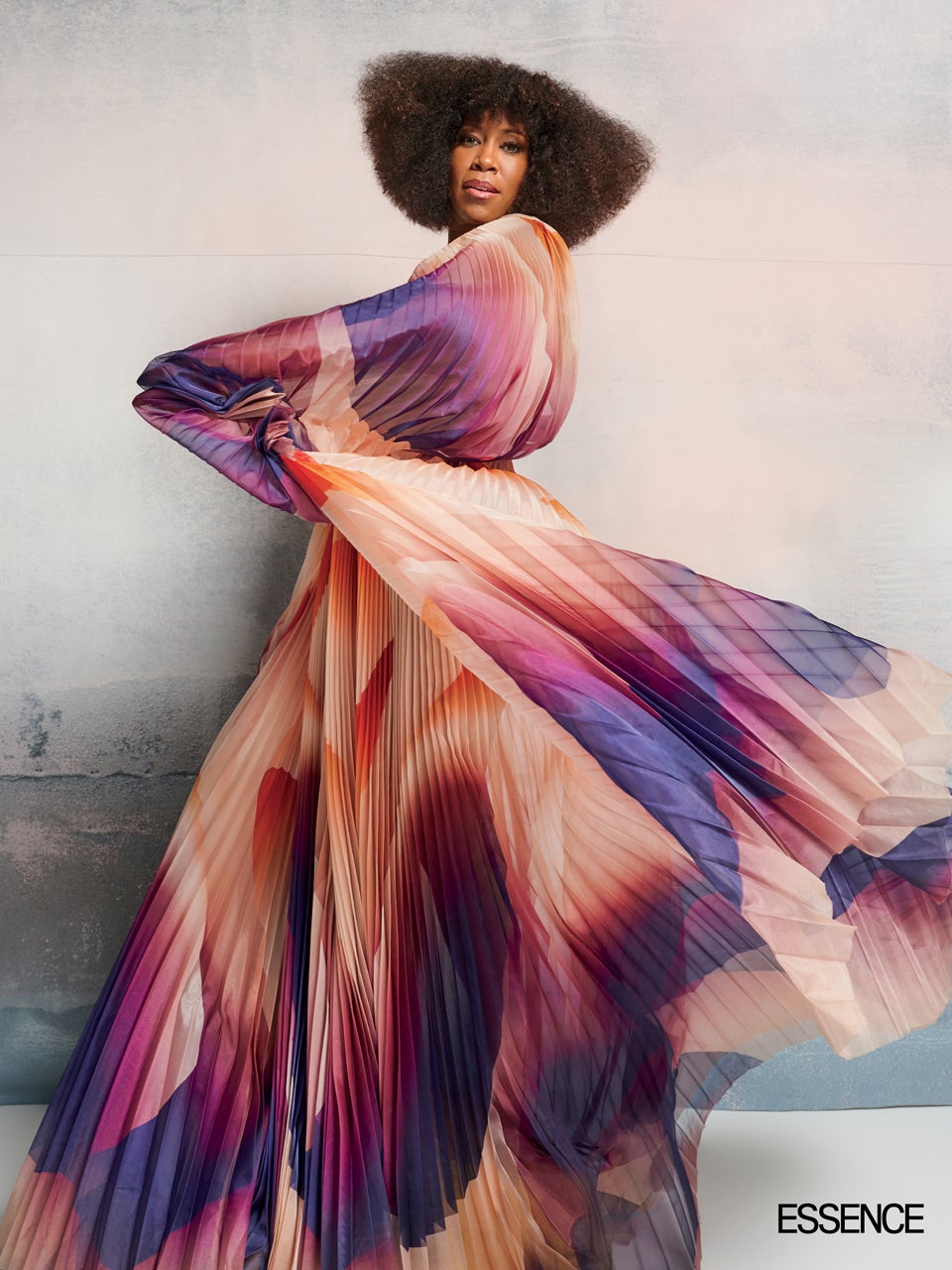
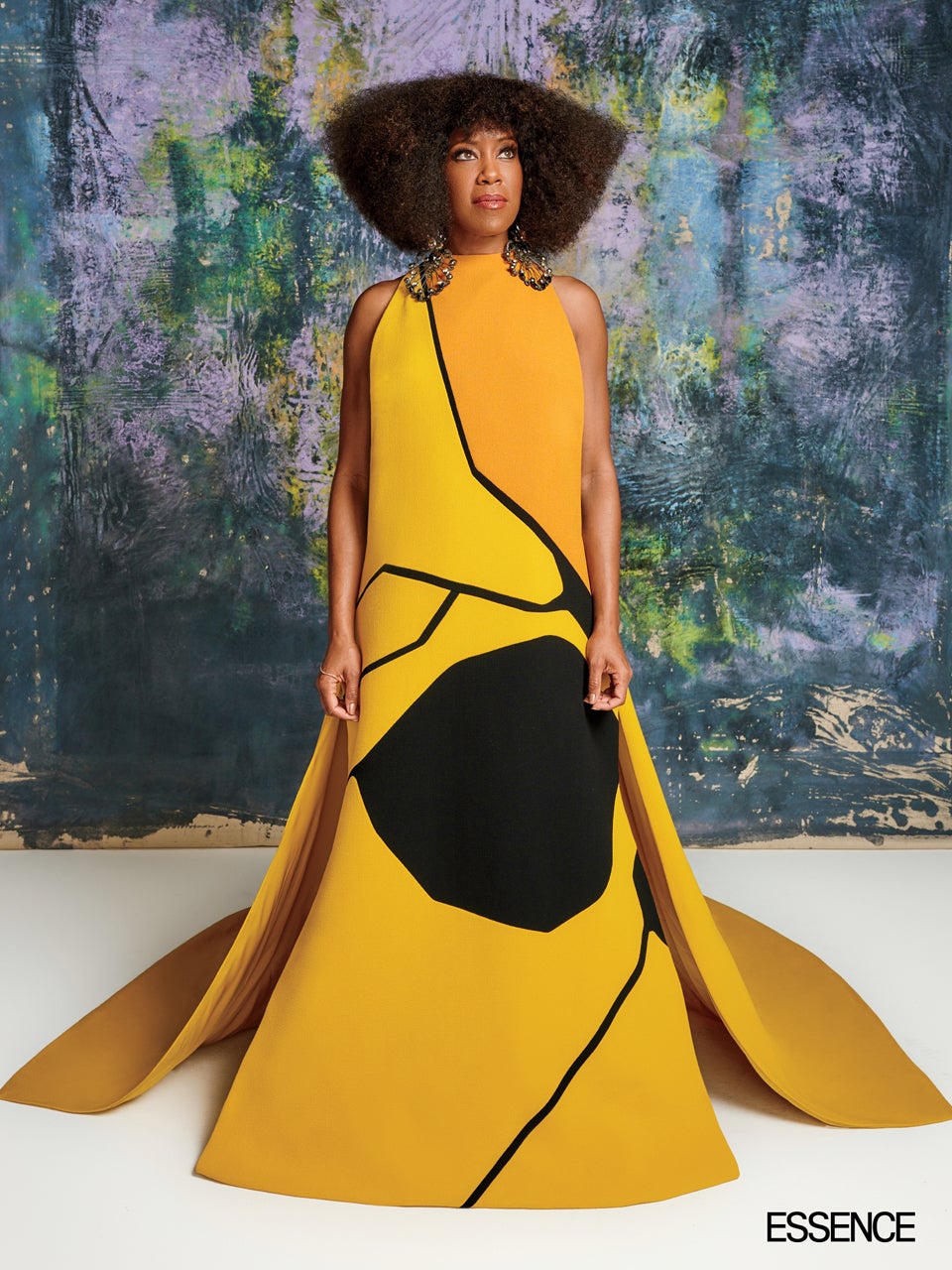
Even before her name was spoken, the ballroom at the Beverly Wilshire erupted. The entire audience was on its feet. Once at the podium, King paused for a beat to take in the love. Like the accolades coming her way, it was unstinting and well deserved. Three days later inside the Dolby Theatre, when she took home that Academy Award, the standing ovation was once again thunderous. King smiles now as she recalls the moments leading up to her big win. “I was thinking, Okay, it’s happening; it’s happening, so what’s your face going to be? Then I looked over at my mom, who is the epitome of grace, and I just knew I’d have the right face, regardless of the outcome.”
Her Oscar season was made even sweeter by the fact that she was already on to her next project— bringing life to Angela Abar, aka Sister Night, her multimask-wearing, kick-ass character on Watchmen. “It was a gift to have something else that I was passionate about, because at the end of the day, it comes down to the work and the art,” she says. “I still needed to go run my lines, you know?”
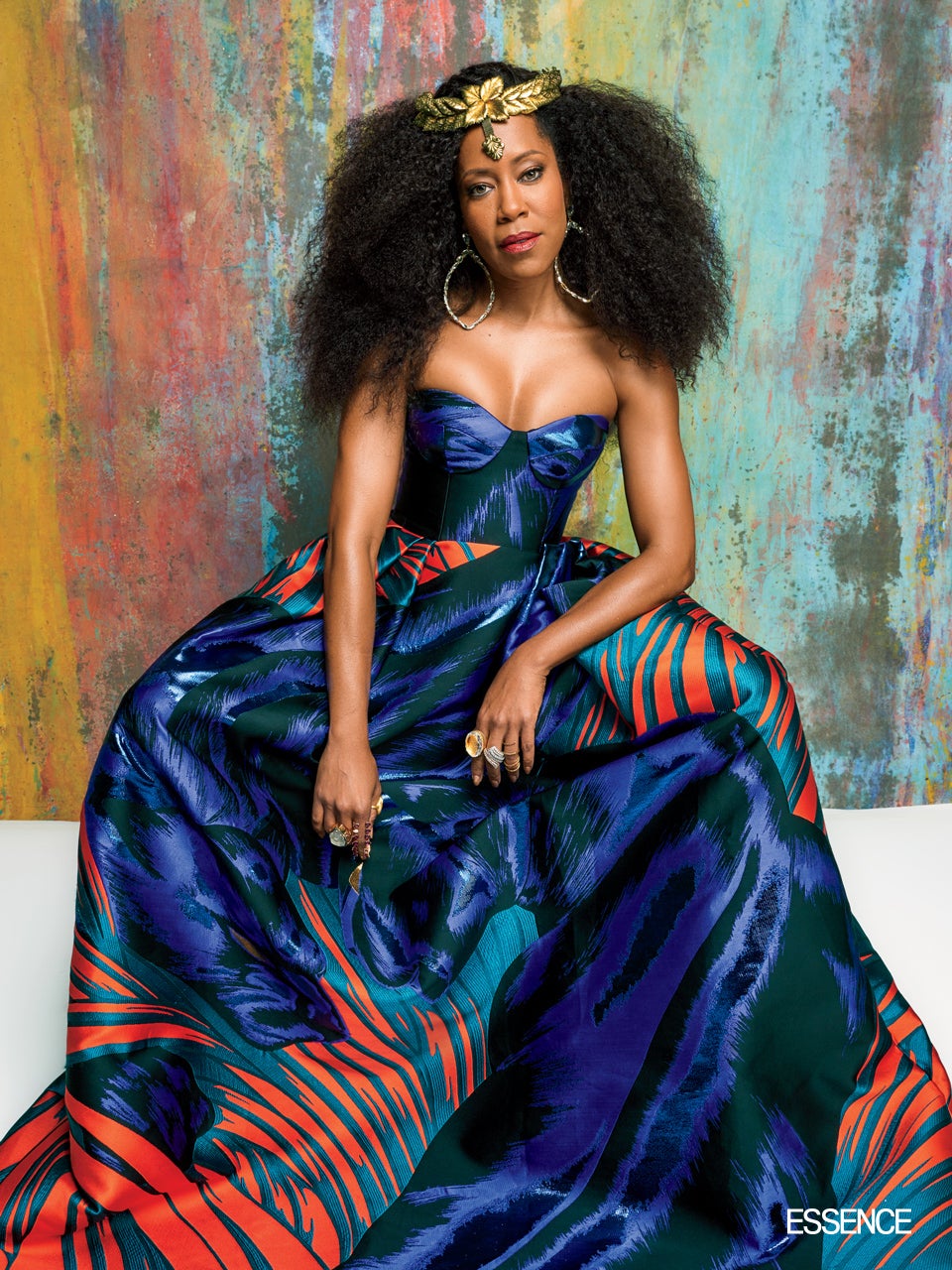
King had previously collaborated with the creator and executive producer of the comic book-turned-series, Damon Lindelof, on The Leftovers. “I have this rule about not working with the same actors project to project, but even in the writers’ room, we were accidentally referring to the character as Regina instead of Angela,” he says. “She’s so much more than number one on the call sheet. She’s a natural leader and an inspiration.”
Co-star Yahya Abdul-Mateen II speaks highly of King, too. “It was very easy to build a rapport with Regina,” he says. “From our first chemistry read, she lit up the room with her charm and charisma. She makes the work really easy.”
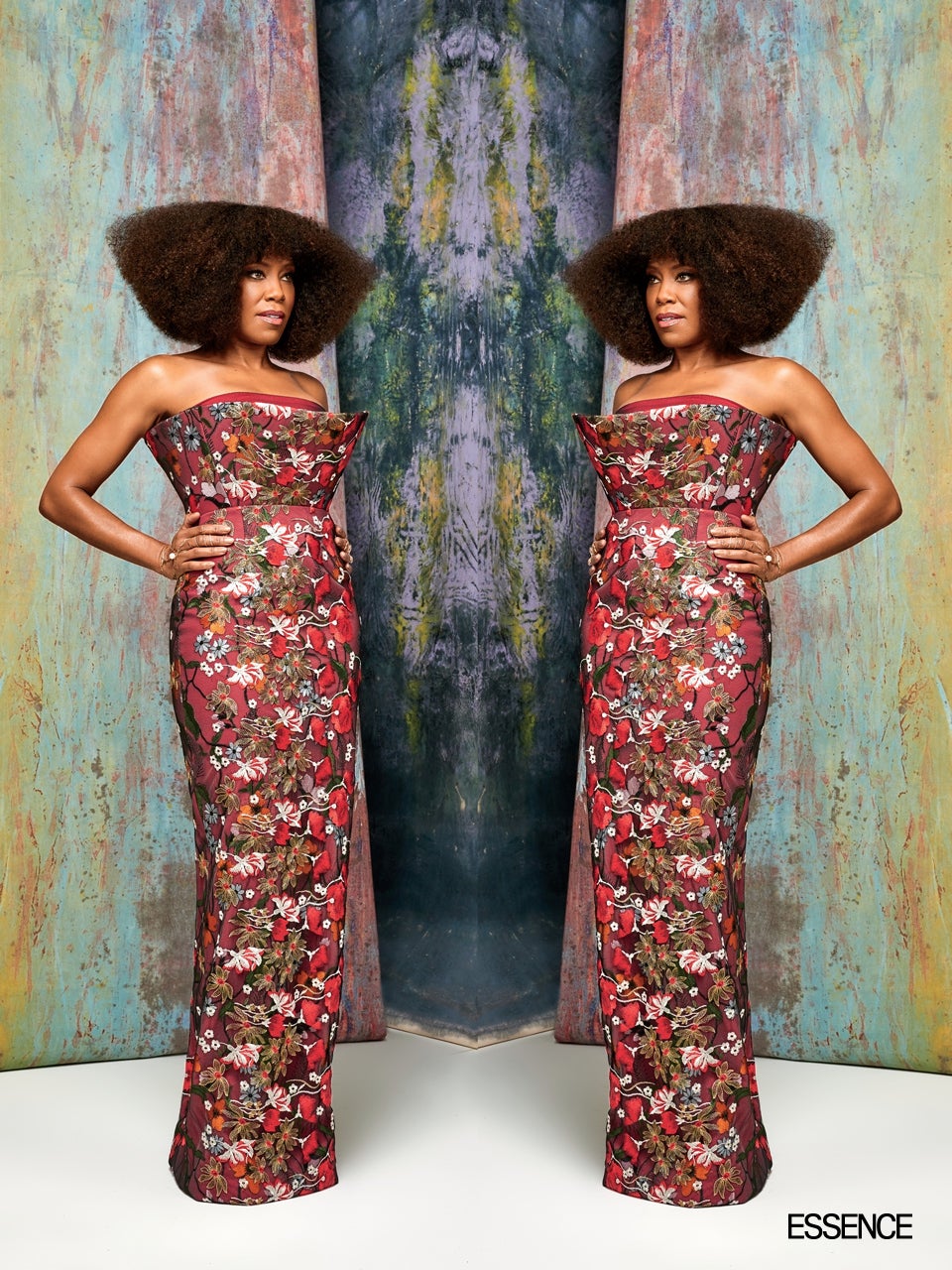
In the 34 years since she made her primetime debut as the sitcom 227’s resident teen, Brenda Jenkins, King has been a constant presence on film and television screens. Her body of work not only spans decades, but also defies genres, which is evident by the diversity of her fan base. There are those who know her from If Beale Street Could Talk and from her Emmy-winning performances in American Crime and Seven Seconds. Others fondly remember her 1991 film debut in Boyz n the Hood, as well as her turns in Jerry Maguire, Ray, The Boondocks, Friday, 24 and on and on. Meanwhile, millennials and Generation Zers grew up watching her in rom-com sequels like Miss Congeniality 2 and Legally Blonde 2.
The actress herself marvels at the range of her roles. “About five or six years ago, I kept hearing people ask, ‘Are you Rhonda?’ and I was like, ‘Who’s Rhonda?’ ” says King with a laugh. She fesses up to not always remembering her characters’ names. “Then I realized they were talking about Rhonda from A Cinderella Story,” she continues. So did she ever imagine her career would have this kind of longevity? She doesn’t answer the question directly. “I would say that I’ve tried to listen to the voice inside,” she says instead. “Luckily, from a very early age, I was able to understand that when things don’t feel quite right, that was probably not the role for me.”
It’s no accident that the regal actress is named Regina. “My father did that on purpose,” she says of being crowned with a royal moniker—along with her younger sister, Reina, whose name also means queen. “When Reina was born, I realized we were both ‘Queen Kings.'” And as in chess, in which the queen has all the power, King moves freely in every direction. She knows that Hollywood, like the board game, is all about strategy, and she plays her queen position flawlessly, taking nothing for granted.
In 2015 she was nominated for, and won, her first Primetime Emmy for Outstanding Supporting Actress, for American Crime. “That first award is nice and cozy,” says King, who went on to win again for American Crime in 2016 and for Seven Seconds in 2018. While awards are certainly not the measure of an artist’s ability, the fact that she had been overlooked for top honors in the years before is baffling. Undeterred, she kept pushing, and in 2010 she directed and co-starred in the music video for Jaheim’s “Finding My Way Back.” That was just the start of her stepping behind the camera. “It goes back to working with Gerren Keith on 227,” she says of her early inspiration to one day take on the role of director. “He directed most of the episodes, and he was always clear and respectful.”
In March 2013, the first “Directed by Regina King” appeared in the credits of an episode of the primetime drama Southland, on which she starred for five seasons. Since then, King’s directorial credits have continued to hit hard—from Insecure, This Is Us, and Greenleaf to Scandal, Being Mary Jane and the television movie Let the Church Say Amen, which she co-produced with her sister Reina through their company, Royal Ties. And King is still growing as an artist. Last spring, she signed a first-look deal with Netflix, and she’s currently gearing up for her feature film directorial debut, One Night in Miami, an adaptation of the 2013 play by Kemp Powers. “It’s a love letter to Black men,” King says of the movie, which is set in 1964 and centers on a young Cassius Clay. “I’m feeling really great about that.”
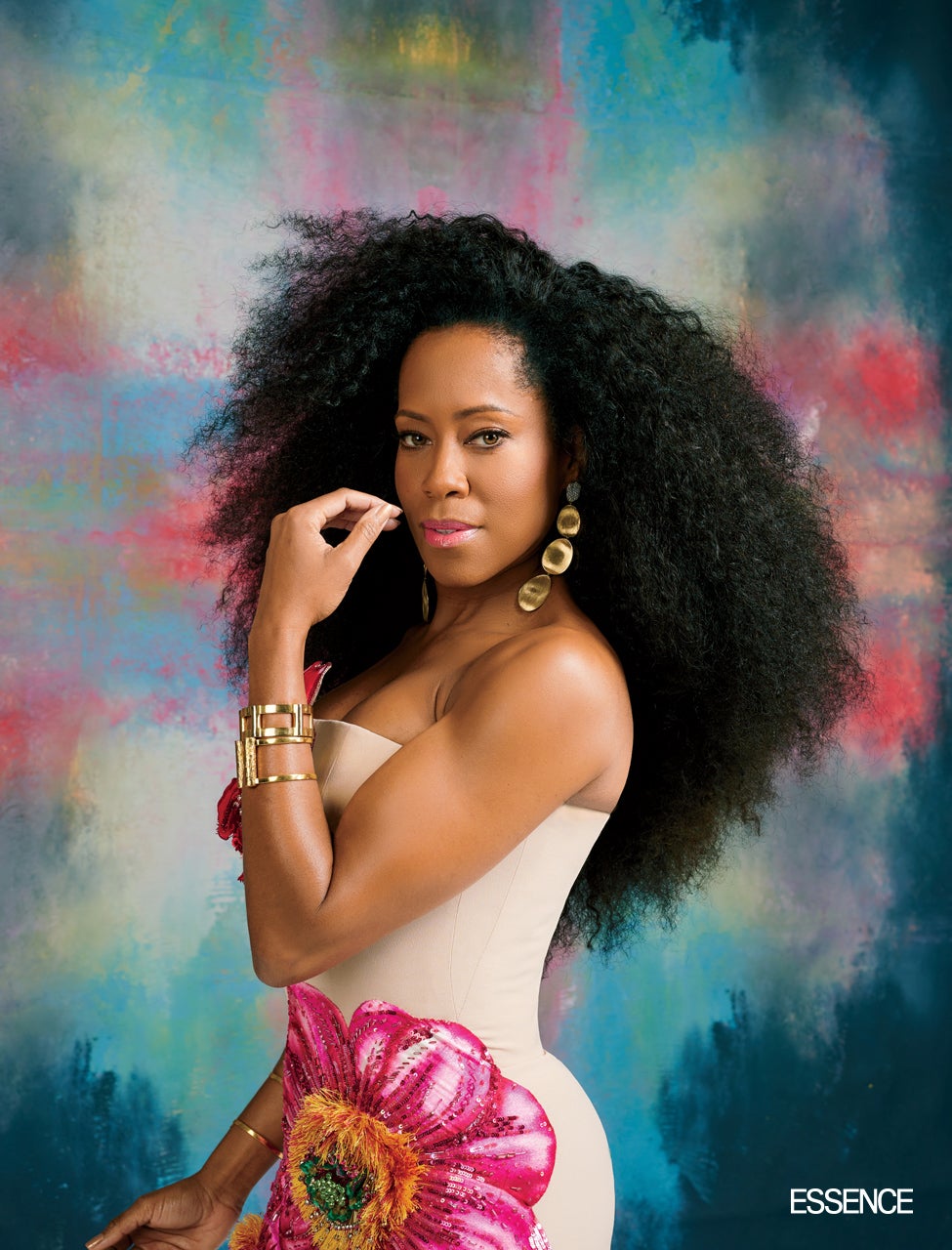
When she accepted the Star Power Award at Black Girls Rock! in September—and received yet another standing ovation—her son, Ian, was by her side cheering her on. She’s proud of the 23-year-old too. “As he’s finding his way, I know there are moments when I have to let him fall,” she says. “I’ve watched him get up, dust off his knees and move on, which is such a beautiful reminder that God’s got him.” That faith may be why King opened her speech that night with lyrics from William Murphy’s song “It’s Working.” She reprises the song now, smiling. “‘This is my season for grace, for favor,’” she sings, then says: “I’ve planted my seeds, and I’ve been toiling and fertilizing them and surrounding myself with the right people.” She pauses to take one last sip of her rosé. “Now it’s all blooming,” she adds, “and I’m grateful for it.”
Regina R. Robertson (@reginarobertson) is ESSENCE’s West Coast editor and author of He Never Came Home.
This interview originally appeared in the December 2020 issue of ESSENCE magazine, available on newsstands now.
Credits:
Photographer: JD Barnes (@jdthecombo)
Stylist: Wayman Bannerman and Micah McDonald (@waymanandmicah)
Hair: Larry Sims (@larryjarahsims)
Makeup: Latrice Johnson (@makeupbylatrice)
Manicure: Jessica Lee
Set Design: Nick Faiella (@nickbot)
Production: Natalie Gialluca (@nataliegialluca)
Videographer: (@khomariflashfilms)
Video Editor: (@marquismalik)
